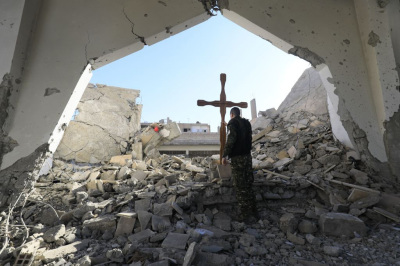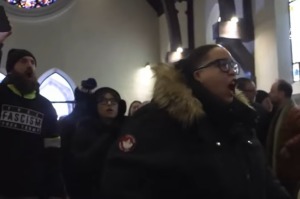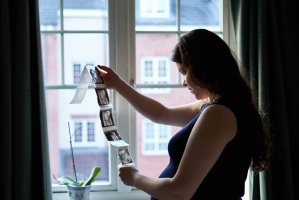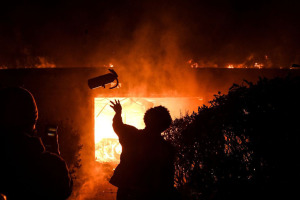Offering hope for Christians in the Middle East

The Christians of northeastern Syria, most of whom are the descendants of genocide survivors that took place in 1921 in what is Turkey today, did not have the opportunity to participate in politics and have always been treated as subjects or protectorates.
Today, they have their security forces, and they participate in governance in all executive, legislative and judicial positions in northeastern Syria. Yet, the U.S. should engage more positively with them to preserve this achievement and build on it.
Historically, the Christians of northeastern Syria, mostly Syriac Orthodox and Catholics, fled to southeast Turkey after the Saifo massacre in 1915, which was instigated by the Turkish state and carried out by pro-Ottoman Kurdish tribes. During the French mandate on Syria, they fled their homeland and were able to build the main cities in northeastern Syria like Qamshli and Al Hasskah.
They developed and diversified the agricultural sector, built markets full of professionals and craftsmen, and turned the semi-desert region inhabited by nomadic tribes fighting each other into the food basket on which Syria depends even today.
With the departure of the French mandate, and the beginning of Arab national rule, the Syriacs were treated in a protective manner, and successive governments always reminded them that their ancestors were massacred and killed and that the ruling and authoritarian regimes are the only solution to protect them.
This policy intensified with the regime of Hafez al-Assad, who appointed many of them in nominal positions to show himself as a person tolerant of Christians. Still, at the same time, he denied them their cultural and national rights and made it hard for them to learn their language in their private schools.
Until 2011 with the outbreak of the Syrian uprising, the successive regimes worked to blackmail the Syriac Christians tacitly and remind them that the maximum of their aspirations was to live in their own neighborhoods without being subjected to the same harassment and persecution that their ancestors lived through.
That all changed at the beginning of 2011. The status quo started to change in Syria and Islamist armed groups and local looters began to target the Christians of northeastern Syria to gain wealth and money, as hundreds of successful businessmen and doctors from the community were kidnapped for ransom. Many of my relatives and acquaintances from Hassake and Qamishli were abducted, which resulted in the migrations of tens of thousands of Christians who fled to Europe or to other Syrian cities that were more secure, like Damascus, and Latakia.
When the Kurdish-led Autonomous Administration in northeastern Syria and the United States started to work together to fight ISIS, the Syriacs benefited from the principles of self-rule that the Syrian Kurds believe in. They were able to build self-defense units and made the Syriac language the second official language in their areas of residence.
With the United States' presence in northeastern Syria and the U.S. partnership with the Syrian Democratic Forces, the American government can engage more with the Syriacs and work on training their brigades extensively as it does with the Kurdish special forces. America has direct access today to the region and can work to support educational institutions for the Syriac Christians and support programs that encourage Syriacs to return to their historic cities.
The fact that this community has survived the Saifo massacres and turned the semi-desert region of northeastern Syria into the food basket that used to feed all of Syria, is a miracle. The U.S. should not waste this rare opportunity and engage directly with the Syriac political forces to strengthen them in a way that can enable them to govern themselves and play a key role in crafting the political future of the region. There is an enormous potential that the Syriacs can bring to the future of Christianity in the Middle East.
By becoming a unique model for an empowered and vivid Christian community in the region, they show us all that the extinction of Christianity in the Middle East is not a foregone conclusion. They deserve our support and prayers.
Hadeel Oueis is a Philos Project Senior Fellow.



























